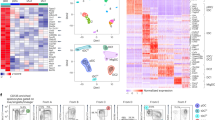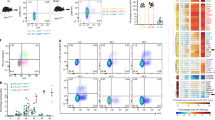Abstract
Adenovirus-mediated gene transfer to dendritic cells is highly efficient and often used, but the relationship among cell maturation, viral infection and expression of a transferred gene remains unclear. To study this relationship, we introduced a recombinant replication-defective adenovirus encoding the gene for green fluorescent protein to normal human immature myeloid dendritic cells. We induced maturation by the addition of TNF-α, IL-1β, IL-6 and prostaglandin E2 to the medium and assessed cell maturity by the levels of the secreted p40 subunit of IL-12 and of membrane-bound CD83. We quantified the efficiency of gene expression by GFP fluorescence and analyzed the data by a mixed-model analysis of variance; the model explained more than 97% of the effects. CD83 expression and p40 secretion depended solely on incubation time and maturation medium. The cells cultured in the absence of maturation medium remained immature and maintained the ability to respond to the later addition of the maturation irrespective of adenovirus infection and transferred gene expression. This expression was independent of cell maturation. In comparison with mature cells, the transferred gene was expressed in immature dendritic cells with a lag compatible with the less effective initial step (infection and/or gene transfer) in the absence of the maturation medium rather than less effective later GFP synthesis. Expression of CD83 and p40 were unaffected by adenovirus infection and transferred gene expression. Thus, immature dendritic cells infected with recombinant adenoviruses can be matured when desired after transferred gene expression.
This is a preview of subscription content, access via your institution
Access options
Subscribe to this journal
Receive 12 print issues and online access
$259.00 per year
only $21.58 per issue
Buy this article
- Purchase on Springer Link
- Instant access to full article PDF
Prices may be subject to local taxes which are calculated during checkout




Similar content being viewed by others
References
Banchereau J, Steinman RM . Dendritic cells and the control of immunity Nature 1998 392: 245–252
Lotze MT et al. Dendritic cell based therapy of cancer Adv Exp Med Biol 1997 417: 551–569
Arthur JF et al. A comparison of gene transfer methods in human dendritic cells Cancer Gene Ther 1997 4: 17–25
Dietz AB, Vuk-Pavlović S . High efficiency adenovirus-mediated gene transfer to human dendritic cells Blood 1998 91: 392–398
Wright P, Zheng C, Moyana T, Xiang J . Intratumoral vaccination of adenovirus expressing fusion protein RM4/tumor necrosis factor (TNF-α) induces significant tumor regression Cancer Gene Ther 1998 5: 371–379
Molnar-Kimber KL et al. Impact of preexisting and induced humoral and cellular immune responses in an adenovirus-based gene therapy phase I clinical trial for localized mesothelioma Hum Gene Ther 1998 9: 2121–2133
Dai Y et al. Cellular and humoral immune responses to adenoviral vectors containing factor IX gene: tolerization of factor IX and vector antigens allows for long-term expression Proc Natl Acad Sci USA 1995 92: 1401–1405
Brossart P et al. Virus-mediated delivery of antigenic epitopes in dendritic cells as a means to induce CTL J Immunol 1997 158: 3270–3276
Wan Y et al. Murine dendritic cells transduced with an adenoviral vector expressing a defined tumor antigen can overcome anti-adenovirus neutralizing immunity and induce effective tumor regression Int J Oncol 1999 14: 771–776
Gong J, Chen D, Kashiwaba M, Kufe D . Induction of antitumor activity by immunization with fusions of dendritic and carcinoma cells Nature Med 1997 3: 558–561
Butterfield LH et al. Generation of melanoma-specific cytotoxic T lymphocytes by dendritic cells transduced with a MART-1 adenovirus J Immunol 1998 161: 5607–5613
Ribas A et al. Genetic immunization for the melanoma antigen MART-1/MELAN-A using recombinant adenovirus-transduced murine dendritic cells Cancer Res 1997 57: 2865–2869
Wan Y et al. Dendritic cells transduced with an adenoviral vector encoding a model tumor-associated antigen for tumor vaccination Hum Gene Ther 1997 8: 1355–1363
Song W et al. Dendritic cells genetically modified with an adenovirus vector encoding the cDNA for a model antigen induce protective and therapeutic antitumor immunity J Exp Med 1997 186: 1247–1256
Zhong L, Granelli-Piperno A, Choi Y, Steinman RM . Recombinant adenovirus is an efficient and nonperturbing genetic vector for human dendritic cells Eur J Immunol 1999 29: 964–972
Jonuleit H et al. Pro-inflammatory cytokines and prostaglandins induce maturation of potent immunostimulatory dendritic cells under fetal calf serum-free conditions Eur J Immunol 1997 27: 3135–3142
Matasić R, Dietz AB, Vuk-Pavlović S . Dexamethasone inhibits dendritic cell maturation by redirecting differentiation of a subset of cells J Leukocyte Biol 1999 66: 909–914
Zhou L-J, Tedder TF . CD14+ blood monocytes can differentiate into functionally mature CD83+ dendritic cells Proc Natl Acad Sci USA 1996 93: 2588–2592
Kiertscher SM, Roth MD . Human CD14+ leukocytes acquire the phenotype and function of antigen-presenting cells when cultured in GM-CSF and IL-4 J Leukocyte Biol 1996 59: 208–218
Matasić R, Dietz AB, Vuk-Pavlović S . Cyclooxygenase-independent inhibition of dendritic cell maturation by aspirin Immunology 2000 101: 53–60
Rea D et al. Adenoviruses activate human dendritic cells without polarization toward a T-helper type 1-inducing subset J Virol 1999 73: 10245–10253
Linette GP et al. In vitro priming with adenovirus/gp100 antigen-transduced dendritic cells reveals the epitope specificity of HLA-A*0201-restricted CD8+ T cells in patients with melanoma J Immunol 2000 164: 3402–3412
Acknowledgements
This work was supported by a grant from Mrs Adelyn L Luther, Singer Island, Florida, and by the Mayo Clinic Cancer Center. ABD is a Glen and Florence Voyles Foundation Scholar. We thank Dr Franklyn G Prendergast for his continuing interest and support.
Author information
Authors and Affiliations
Rights and permissions
About this article
Cite this article
Dietz, A., Bulur, P., Brown, C. et al. Maturation of dendritic cells infected by recombinant adenovirus can be delayed without impact on transgene expression. Gene Ther 8, 419–423 (2001). https://doi.org/10.1038/sj.gt.3301406
Received:
Accepted:
Published:
Issue Date:
DOI: https://doi.org/10.1038/sj.gt.3301406
Keywords
This article is cited by
-
Vaccination of fiber-modified adenovirus-transfected dendritic cells to express HER-2/neu stimulates efficient HER-2/neu-specific humoral and CTL responses and reduces breast carcinogenesis in transgenic mice
Cancer Gene Therapy (2008)
-
IL-12p70 and IL-18 gene-modified dendritic cells loaded with tumor antigen-derived peptides or recombinant protein effectively stimulate specific Type-1 CD4+ T-cell responses from normal donors and melanoma patients in vitro
Cancer Gene Therapy (2006)
-
HER-2/neu-gene engineered dendritic cell vaccine stimulates stronger HER-2/neu-specific immune responses compared to DNA vaccination
Gene Therapy (2006)
-
Gene transduction efficiency and maturation status in mouse bone marrow-derived dendritic cells infected with conventional or RGD fiber-mutant adenovirus vectors
Cancer Gene Therapy (2003)



